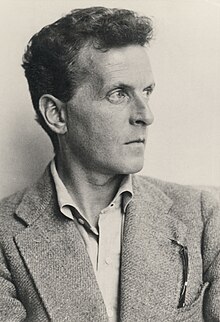Wittgenstein
| Ludwig Wittgenstein |

Wittgenstein in 1930
|
| Born |
Ludwig Josef Johann Wittgenstein
(1889-04-26)26 April 1889
Vienna, Austria-Hungary
|
| Died |
29 April 1951(1951-04-29) (aged 62)
Cambridge, England
|
| Cause of death |
Prostate cancer |
| Nationality |
Austrian and British
|
| Education |
Realschule in Linz ()
|
| Alma mater |
Technische Hochschule, Berlin
(Diploma, 1908)
Victoria University of Manchester
(No Degree)
Trinity College, Cambridge
(PhD, 1929) |
| Notable work |
Tractatus Logico-Philosophicus
Blue and Brown Books
Philosophical Investigations
On Certainty
Culture and Value
Remarks on Colour
|
| Website |
The Wittgenstein Archives at the University of Bergen
The Cambridge Wittgenstein Archive
|
|
| Era |
20th Century Philosophy |
| Region |
Europe |
| School |
Analytic philosophy
Linguistic turn
Logical atomism
|
| Institutions |
Trinity College, Cambridge |
|
Main interests
|
Logic, metaphysics, philosophy of language, philosophy of mathematics, philosophy of mind, epistemology
|
|
Notable ideas
|
Picture theory of language
Truth functions
States of affairs
Logical necessity
Meaning is use
Language-games
Private language argument
Family resemblance
Rule following
Forms of life
Wittgensteinian fideism
Anti-realism
Wittgenstein's philosophy of mathematics
Ordinary language philosophy
Ideal language analysis
Meaning scepticism
Memory scepticism
Semantic externalism
Quietism
|
Influences
-
Gottlob Frege, Johann Wolfgang Goethe, Søren Kierkegaard, Fyodor Dostoyevsky, G. E. Moore, Oswald Spengler, Ludwig Boltzmann, Karl Kraus, Adolf Loos, Piero Sraffa, Otto Weininger, Bertrand Russell, Arthur Schopenhauer, Baruch Spinoza, Leo Tolstoy, Heinrich Hertz, Hermann von Helmholtz
|
Influenced
-
Rogers Albritton, Bertrand Russell, G. E. Moore, Frank P. Ramsey, Vienna Circle, Rudolf Carnap, Alan Turing, G. E. M. Anscombe, Peter Geach, Barry Stroud, John McDowell, Daniel Dennett, Cora Diamond, Gilbert Ryle, Saul Kripke, John Searle, Hans Sluga, Peter Hacker, Ian Hacking, Stephen Toulmin, Quentin Skinner, Jean-François Lyotard, Richard Rorty, Jules Vuillemin, Jacques Bouveresse, Reuben Goodstein, Casimir Lewy, Thomas Kuhn
|
| Signature |
 |
Ludwig Josef Johann Wittgenstein (;German: [ˈvɪtgənˌʃtaɪn]; 26 April 1889 – 29 April 1951) was an Austrian-British philosopher who worked primarily in logic, the philosophy of mathematics, the philosophy of mind, and the philosophy of language. From 1929 to 1947, Wittgenstein taught at the University of Cambridge. During his lifetime he published just one slim book, the 75-page Tractatus Logico-Philosophicus (1921), one article, one book review and a children's dictionary.His voluminous manuscripts were edited and published posthumously. Philosophical Investigations appeared as a book in 1953, and has since come to be recognised as one of the most important works of philosophy in the twentieth century. His teacher Bertrand Russell described Wittgenstein as "the most perfect example I have ever known of genius as traditionally conceived; passionate, profound, intense, and dominating."
Born in Vienna into one of Europe's richest families, he inherited a large fortune from his father in 1913. He initially made some donations to artists and writers and then, in a period of severe personal depression after the First World War, he then gave away his entire fortune to his brothers and sisters. Three of his brothers committed suicide, with Wittgenstein contemplating it too. He left academia several times—serving as an officer on the front line during World War I, where he was decorated a number of times for his courage; teaching in schools in remote Austrian villages where he encountered controversy for hitting children when they made mistakes in mathematics; and working as a hospital porter during World War II in London where he told patients not to take the drugs they were prescribed while largely managing to keep secret the fact that he was one of the world's most famous philosophers. He described philosophy as "the only work that gives me real satisfaction."
...
Wikipedia


